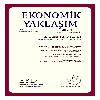Bilim Felsefesi, Karl Popper, Eleştiri ve İktisat
Philosophy of Science, Karl Popper, Critics and Economics
___
- BLANCHARD, Olivier J. (2008): “The State of Macro”, NBER Working Paper No: 14259, August
- BLAUG, Mark (1980): The Methodology of Economics, Cambridge University Press
- BOLAND, Lawrence, A. (1998): “Critical Rationalism”, in J.B. Davis, D.W. Hands and U.Maki, (edts): The Handbook of Economic Methodology, Cheltenham: Edward Elgar, 86-88
- BOLAND, Lawrence, A (2005): Critical Economic Methodology: A Personal Odyssey, London and New York: Routledge.
- CALDWELL, Bruce. J. (1991): Clarifying Popper”, Journal of Economic Literature, XXIX, March, 1-33
- CALDWELL, Bruce J.(1994): Beyond Positivism: Economic Methodology in the Twentieth Century, Revisied Edition, Routledge
- CALDWELL, Bruce (2004): Hayek’s Challenge: An Intellectual Biografhy of F. A. Hayek, Chicago & London: The University of Chicago Press
- CARTWRIGHT, Nancy (1999): The Dappled World: A Study of the Boundaries of Science, Cambridge University Press
- CROSS, Rod (1994): “The Duhem Quinn Thesis, Lakatos and The appraisal of Theories in Macroeconomics”, The Economic Journal, 92, 320-340
- DARNEL, Adrian C. ve J. L. Evans (2000) : The Limits of Econometrics, Celthenman: Edward Elgar
- DEBREU, Gerard (1984): “Economic Theory in the Mathematical Mode”, American Economic Review, 81(1), March, 1-7
- FEYERABEND, Paul (1995): Akla Veda, İstanbul: Ayrıntı
- HANDS, D. Wade (2001): “Economic Methodology is Dead:Long Live Economic Methodology: Thirteen Theses on the New Methodology”, Journal of Economic Methodology, 8(1), 49-63
- HAUSMAN, Daniel M. (1988): “ An Appraisal of Popperian Methodology”, N. de Marchi (ed.) The Popperian Legacy in Economics, Cambridge: Cambridge University Press, 65-86
- HAUSMAN, Daniel M. (1989): Economic Methodology in a Nutshell”, Journal of Economic Perspectives, 3(2), 115-127
- HAUSMAN, Daniel M. (1992): The Inexact and Separate Science of Economics, Cambridge: Cambridge University Press
- HAYEK, Friedrich A.(1978): New Studies in Philosophy, Politics and Economics, Routledge Kegan Paul
- HUTCHISON, Terence W. (1964): Positive Economics Policy Judgements, London: George Allen &Unwin
- KEIZER, Willem (1989): “Recent Reinterpretations of the Socialist Calculation Debate”, Journal of Economic Studies, 16(2), 63-68
- KUHN, Thomas S.(1982): Bilimsel Devrimlerin Yapısı, İstanbul: Alan Yayıncılık
- KUHN, Thomas S. (1994) : Asal Gerilim, Kabalcı:İstanbul
- LAKATOS, Imre (1982): “Yanlışlama ve Bilimsel Araştırma Programlarının Metodolojisi”, I.Lakatos ve A. Musgrave (edts): Bilginin Gelişimi ve Bilginin Gelişimiyle İlgili Teorilerin Eleştirisi, İstanbul:Paradigma, 111-242
- LAVOIE, Don (1985): Rivalry and Central Planning, Cambridge University Press
- LEAMER, Edward E. (1983): “Let’s Take the Con Out of Econometrics”, American Economic Review, 73(1), 31-43
- MAGNUS, Jan R. (1999): “The Success of Econometrics”, De Economist, 147(1), 55-71
- McCLOSKEY, Dairdre N. (1985): The Rhetoric of Economics, Wisconsin: The University of Wisconsin Press
- MILL, John Stuart (1985): Özgürlük Üstüne, Belge Yayınları
- MISES, Ludwig von (1998): Human Action: A Treatise on Economics, The Scolar’s Edition, Auburn: Ludwig Von Mises Institute,
- MUSGRAVE, Alan (1997): Sağduyu, Bilim ve Kuşkuculuk: Bilgi Kuramına Eleştirel Bir Bakış, Çeviren Pelin Uzay, İstanbul:Göçebe Yayınları
- NİİLİHİUOTO, Ilkka (1998): “Fallibilism”, J.B. Davis, D.W.Hands and U. Maki (edts.) The Handbook of Economic Methodology, Celtenham:Edward Elgar, 181-183
- PHEBY, John (1988): Methodology and Economics, M.E. Sharpe, Inc, New York
- POPPER, Karl R. (1968): Açık Toplum ve Düşmanları: Hegel ve Marx, Cilt II, Ankara: Türk Siyasi İlimler Derneği Yayınları
- POPPER, Karl R. (1979): Objective Knowledge: An Evolutionary Approach, Revised Edition, Clarendon Press:Oxford
- POPPER, Karl R. (1982a): Un-ended Quest An Intellectual Autobiography, Fontana/Collins, Glasgow
- POPPER, Karl R. (1982b): “Toplum Bilimlerinde Öndeyi ve Kehanet”, Bryan Magee, Karl Popper’in Bilim Felsefesi ve Siyaset Kuramı, 1982, İstanbul: Remzi Kitapevi
- POPPER, Karl R. (1983): Conjectures and Refutations: The Growth of Scientific Knowledge, London : Routledge, 1963
- POPPER, Karl R. (1985): Tarihselciliğin Sefaleti, İnsan Yayınları
- POPPER, Karl R. (1985a): “The Anatomy of Sociology (1945)”, D. Miller (ed.) Popper Selections, Princeton University Press: Princeton, New Jersey,
- POPPER, Karl R. (1985b): “The Rationality Principle (1967)”, D. Miller (ed.) Popper Selections, 1985, Princeton, New Jersey: Princeton University Press
- POPPER, Karl R. (1998): Bilimsel Araştırmanın Mantığı, İstanbul : Yapı Kredi Yayınları
- POPPER, Karl R. (2001): Daha İyi Bir Dünya Arayışı, İstanbul:Yapı Kredi Yayınları
- POPPER, Karl R. (2005): Hayat Problem Çözmektir, İstanbul: Yapı Kredi Yayınları
- SIMKIN, Colin (1993): Popper’s Views on Natural and Social Science, Leiden, The Netherlands: E. J. Brill
- SRAFFA, Piero. (1960): Production of Commodities by means of Commodities, Cambridge: Cambridge University Press
- STEELE, David R. (1992): From Marx to Mises, Open Court
- STOKES, Geoff (1998): Popper:Philosophy, Politics and Scientific Method, , Cambridge:Polity Press
- WETTERSTEN, John R. (1992): The Roots of Critical Rationalism, Amsterdam-Atlanta: Rodopi
- YAY, Turan (2005): “İktisadın Kapsamı ve Yöntemi Üzerine”, Ekonomik Yaklaşım, Gazi Üniversitesi İktisat Bölümü Dergisi, 16(57), 1-33
- YAY, Turan (2007): “İktisatta Değer Yargılarının Yeri ve Önemi Üzerine”, T.Yay ve G. G. Yay, İktisat Yazıları: Metodoloji, Düşünce, Politika,
- ISSN: 1300-1868
- Yayın Aralığı: 3
- Yayıncı: Ekonomik Yaklaşım Derneği
Keynes Devrimi ve Keynesyen İktisat
Mahir FİSUNOĞLU, Bilge TAN KÖKSAL
Kuyumculuk Kümeleri: İstanbul Kapalıçarşı ile Dünya Örneklerinin Karşılaştırmalı Değerlendirmesi
Aysu UĞURLAR, Tanyel ECERAL ÖZELÇİ, Bilge KÖROĞLU ARMATLI
Bilim Felsefesi, Karl Popper, Eleştiri ve İktisat
Hazine Borç Yönetiminde Risk Analizi Uygulamasının Yasal ve İdari Açıdan Değerlendirilmesi
